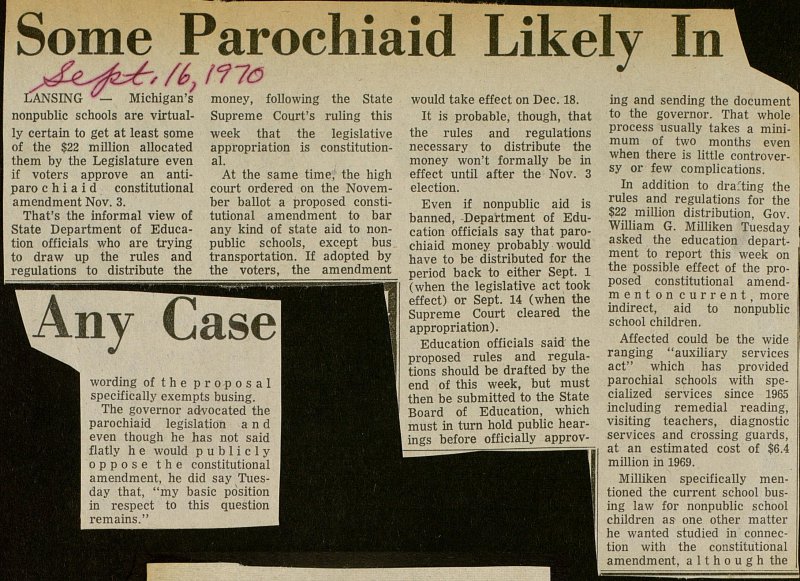Some Parochiaid Likely In Any Case

LANSING w- Michigan's nonpublic schools are virtually certain to get at least some of the $22 million allocated them by the Legislatura even if voters approve an antiparo c h i a i d constitutional amendment Nov. 3. That's the informal view of State Department of Education officials who are trying to draw up the rules and regulations to distribute the money, following the State Supreme Court's ruling this week that the legislative appropriation is constitutional. At the same time, the high court ordered on the November ballot a proposed constitutional amendment to bar any kind of state aid to nonpublic schools, except bus transportation. If adopted by the voters, the amendment would take effect on Dec. 18. It is probable, though, that the rules and regulations necessary to distribute the money won't formally be in effect until after the Nov. 3 election. Even if nonpublic aid is banned, Department of Education officials say that parochiaid money probably would have to be distributed for the period back to either Sept. 1 (when the legislative act took effect) or Sept. 14 (when the Supreme Court cleared the appropriation). Education officials said the proposed rules and regulations should be drafted by the end of this week, but must then be submitted to the State Board of Education, which must in turn hold public hearings before officially ing and sending the document to the governor. That whole process usually takes a minimum of two months even when there is little controversy or few complications. In addition to draiting the rules and regulations for the $22 million distribution, Gov. William G. Milliken Tuesday asked the education department to report this week on the possible effect of the proposed constitutional amendmentoncurrent, more indirect, aid to nonpublic school children. Affected could be the wide ranging "auxiliary services act" which has provided parochial schools with specialized services since 1965 including remedial reading, visiting teachers, diagnostic services and crossing guards, at an estimated cost of $6.4 million in 1969. Milliken specifically mentioned the current school busing law for nonpublic school children as one other matter he wanted studied in connection with the constitutional amendment, a 1 1 h o u g h the wording of the proposal specifically exempts busing. The governor advocated the parochiaid legislation and even though he has not said flatly h e would p u b 1 i c 1 y op po se the constitutional amendment, he did say Tuesday that, "my basic pdsition in respect to this question remains."